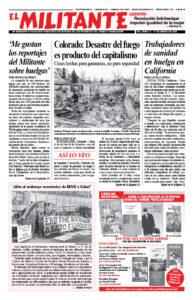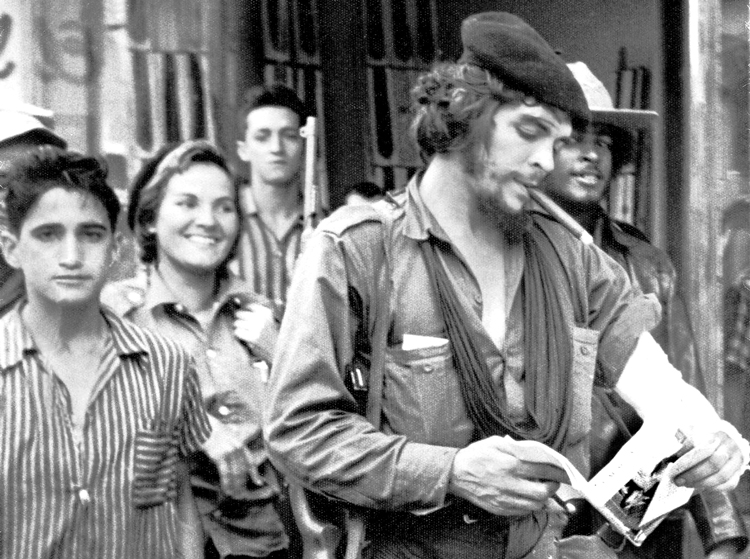Making History: Interviews With Four Generals of Cuba’s Revolutionary Armed Forces by José Ramón Fernández, Enrique Carreras, Harry Villegas, and Néstor López Cuba is one of Pathfinder’s Books of the Month for January. The excerpt below is from an interview by Mary-Alice Waters, the book’s editor, with Villegas, “We Are a Political Army Fully Aware of What We Are Defending.” From 1957 Villegas served under the command of Ernesto Che Guevara in the Rebel Army during the Cuban revolutionary war led by Fidel Castro. Villegas later earned his nom de guerre, Pombo, while serving with Che in Cuba’s internationalist campaigns in the Congo and Bolivia. Copyright © 1999 by Pathfinder Press. Reprinted by permission.
MARY-ALICE WATERS: I’d like to go back to the early days of the revolution and your experiences as a young soldier under Che’s command at La Cabaña. There is a very specific thing related to culture and education, to the social aims of the Rebel Army, that we’d like to ask you about.
One of the recent “biographies” of Che quotes from some dispatches sent by U.S. embassy personnel to Washington during the first months of 1959. The communiqués express concern over what was happening in the garrison at La Cabaña. Che, they reported, was doing something with very disturbing implications. He was organizing a department of culture within the Rebel Army and teaching soldiers to read! The Department of Culture was also doing things like organizing concerts, poetry readings, and ballet performances right there in La Cabaña, not for the officers but for all the soldiers. The dispatch said this was very worrisome, because it showed Che’s communist tendencies.
I think this captures something very important, on both sides. The U.S. government had good reason to be afraid, of course. When education and the cultural conquests of all previous civilization become the property of the working class, when working people take this as their right, their prerogative, the rulers should tremble. A new ruling class is in the process of asserting itself. The incident also captures the importance that not only Che but the entire leadership of the Rebel Army gave to education, to broadening the cultural horizons of working people. It captures the class character . . .
HARRY VILLEGAS: . . . of the revolution.
WATERS: Yes, and the aspirations of working people to transform themselves, to educate themselves, to be the bearers of culture into the future that they alone can build.
VILLEGAS: Che felt that the task of creating and developing the Rebel Army’s Department of Instruction and Culture at the time was not only to encourage the creation of cultural works. Che was the first one to start a campaign for literacy. Because there is no culture without literacy.
The Rebel Army was an army of people with humble origins. If you read the book Secretos de generales, you’ll see that almost all the generals interviewed come from families of workers or peasants. That was the composition of the Rebel Army. That’s why the first thing we did was set up schools to eradicate illiteracy. The Department of Instruction was created, and everyone who couldn’t read and write was enrolled in these schools. Che looked for teachers and the work began.
As part of all this, a movement was created to bring cultural works to those who had never seen them before, to the members of the Rebel Army. We had a large theater in La Cabaña, a huge theater that could hold the entire garrison. Plays were put on there, ballet performances, and other cultural presentations. Movies were brought in, and other compañeros would join us for discussion after a movie was shown. The purpose of all this was to raise the cultural level of the army, which at that time was very low. Almost all of us were peasants.
I think the North Americans must have been worried, thinking that culture for workers and peasants was a sign of communism. But our purpose was to create a movement that later grew very powerful in the army, with the aim of becoming participants in culture, making it our own. So a group of amateurs developed, which put on plays, performed songs, held festivals. All these things were promoted as part of the process of creating a higher cultural level.
We are still fighting for this today. In the armed forces we’re still fighting for soldiers not to become isolated. Because the life of a military man ends up isolating him from cultural events unless that is consciously combated. For example, I can tell you that one of the hardest things we face in the army is to get soldiers into the habit of going to museums from time to time. You’ve got to take people there. Soldiers don’t spontaneously go to museums very often. The soldier has very little free time, and when he does he looks for other forms of entertainment. We’re fighting hard for this, to get people used to going to museums, to have culture become ingrained in the military environment, to maintain a cultural level, to get people to like cultural events, to like poetry, to like theater. But also for them to be able to know when the poetry is not good, to be able to appreciate the quality of cultural works.
Che was a man with a very high cultural level. He was not just someone with a broad political knowledge. He also had broad cultural knowledge. He liked poetry, the theater, all these things, and he tried to get all of us to take part in it.
Today the entire population has a different cultural level. The Special Period, of course, has meant fewer performances being opened, but now we’re beginning to see a resurgence. We have real theater, like the Escambray Theater Company, which brings plays directly to the countryside, and it’s met a tremendous response.
There’s an element of truth in what the North Americans were saying about this. Nobody writes or produces a play for the sole purpose of educating people about theater. In other countries, people usually do it for money. But in the case of the revolution, it wasn’t for economic reasons. The important thing was getting the message across. Culture enables man to be fuller, more complete, more human, and therefore more revolutionary.


